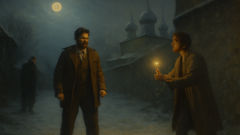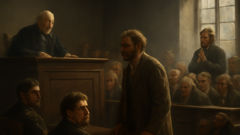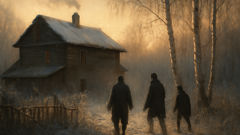Introduction
The Karamazov family home, with its weather-beaten fence and wild, overgrown garden, stood on the outskirts of Skotoprigonyevsk, a provincial Russian town crouched in the shadow of endless birch forests and swept by the wind that howled down from the northern steppes. The Karamazov estate, neither grand nor humble, bore the stains of old quarrels and the echoes of laughter now faded with time. Within these walls, three brothers grew up under the careless, often cruel eye of their father Fyodor, a man whose appetites—carnal and spiritual—devoured everything in his path. Yet each son emerged with a soul as distinct as a Russian winter’s day: Dmitri, the tempestuous eldest, driven by desire and honor; Ivan, the intellectual, tormented by doubt and the relentless search for truth; and Alexei, called Alyosha, gentle as a spring thaw, whose faith was as deep as the Volga. This is not simply a story of a murder or the trial that follows; it is the tangled chronicle of faith and skepticism, of love grown fierce and hate grown tender, a tapestry woven with threads of guilt, forgiveness, and the question of whether redemption can ever be achieved by men born into darkness. Through the brothers’ eyes, we travel the muddy lanes of the town, watch the pale sun rise over snowy fields, and stand in silent contemplation before icons flickering in candlelight. The legacy of their father’s sins is inescapable, yet the possibility of grace lingers in every whispered prayer, every act of kindness, every midnight confession. As passions collide and destinies entwine, the Karamazovs must each decide where their ultimate allegiance lies: to reason or to faith, to vengeance or forgiveness, to despair or hope. In the end, the true trial is not held in the courtroom, but in the chambers of the heart.
Blood and Shadows
Dmitri Karamazov slammed the gate behind him, boots crunching on ice, breath ragged in the frozen air. The weight of his father’s voice still clung to him—a voice filled with mockery, promises of inheritance dangled then snatched away, provocations that always stoked the same wild fire in his chest. His fists clenched. Every childhood memory Dmitri owned was colored by Fyodor’s excess: the laughter echoing from smoky parlors, the sudden rages, the way servants scuttled at his approach. But tonight, with the moon shrouded behind torn clouds and snow falling in haphazard gusts, Dmitri felt the old wounds open anew.

He wasn’t alone in his suffering. Ivan, the second son, sat at his desk by a frost-blurred window, books and papers scattered like leaves in a storm. Ivan’s mind was a crucible—logic clashing with longing, certainty undermined by relentless questions. God, justice, free will: he turned them over and over, seeking truth in a universe that seemed to offer only ambiguity. Yet his love for his brothers—though hidden—was a quiet ache beneath all abstractions. Ivan wrote letters he never sent, filled with arguments no one would read, and stared long into the night at the flickering candle flame, haunted by the thought that perhaps even reason was a kind of faith.
Alyosha alone moved quietly, his steps soft on the monastery’s flagstones, his spirit unburdened by the fierce disputes that consumed his family. The youngest Karamazov found peace in the gentle guidance of Elder Zosima, whose humility and wisdom were like balm to Alyosha’s soul. Alyosha believed in forgiveness—not as a doctrine, but as a living act, a way of seeing God’s image in every trembling, flawed human being. When rumors of conflict between his brothers reached him, Alyosha’s first thought was not to judge, but to pray.
The brothers’ paths crossed at dawn, when Dmitri arrived, red-eyed and desperate, at the monastery’s gate. Alyosha greeted him with open arms, feeling the heat of his brother’s pain like a fire pressed to his own chest. Ivan joined them later, hesitant, eyes wary. The three stood together beneath the ancient bell tower as its peal sounded out over fields glazed with hoarfrost. Each felt, in that moment, the unspoken question hanging between them: Could they ever be free of their father’s shadow?
The weeks that followed saw Skotoprigonyevsk whipped into a frenzy of gossip. Fyodor’s affairs—his feuds, his grasping at wealth, his flirtations with Grushenka—set the town abuzz. Dmitri’s jealousy and anger grew until even strangers whispered that blood might soon be spilled. Ivan’s intellect sharpened to a blade; he argued with priests, with lawyers, with his own conscience. Alyosha ran between them, peacemaker and witness, never ceasing in his hope that some reconciliation might be found.
One night, a storm howled over the town, tearing at shutters and rattling doors. Dmitri wandered the streets in torment, wild with suspicion and drink. Ivan, unable to sleep, paced his study, tormented by a feverish vision—a devilish double that taunted him with doubts about goodness, about the very nature of man. Alyosha knelt in the chapel, candlelight flickering over his bowed head, praying not for answers, but for the strength to love in the face of chaos.
At dawn, a scream shattered the silence. Fyodor Karamazov was dead.
The town was seized by fear and curiosity. Who had killed the old man? The evidence pointed in every direction: Dmitri’s wild threats, Ivan’s cryptic behavior, even Alyosha’s quiet comings and goings. Each brother was pulled into the investigation, their secrets dragged into the harsh glare of suspicion. The family legacy—violence, mistrust, yearning for something pure—unraveled in the hands of the law.
Dmitri was arrested, accused by witnesses eager to believe the worst. Ivan withdrew, haunted by guilt and visions he could not explain. Alyosha, despairing yet determined, set out to find the truth—if such a thing could even be grasped amid so much pain. The trial became a spectacle: lawyers shouted, townsfolk jostled for a glimpse of the infamous brothers, and the question lingered in every heart—was justice even possible in such a world?
Throughout it all, the brothers were changed. Dmitri, defiant at first, began to seek forgiveness—first from Alyosha, then from himself. Ivan, on the verge of madness, confessed to Alyosha that he had wished for their father’s death, even if he hadn’t struck the blow. Alyosha, seeing the brokenness in each, offered not condemnation but love. In a candlelit cell, the three Karamazovs faced each other at last—not as rivals or suspects, but as men yearning for redemption. The winter outside seemed to soften, just a little, as though grace might finally descend upon even the darkest night.
The Echoes of Faith and Doubt
The trial of Dmitri Karamazov drew crowds from across the province. In the chilly courtroom paneled with dark wood, townspeople pressed close, faces lit by the pale winter sun filtering through high windows. Dmitri sat at the defendant’s bench, hair disheveled, eyes bloodshot, hands shaking not with fear but with the exhaustion of fighting himself. His lawyer argued fiercely, painting a portrait of a passionate but misunderstood man. But it was Dmitri’s own testimony—raw, wounded, unfiltered—that held the court captive. He spoke not just of his hatred and suspicion toward his father, but of his moments of shame and longing for forgiveness. Every word was a plea for understanding, as if he might confess his way toward some kind of absolution.

Ivan watched from the gallery, fingers curled tight around the rail. The trial had become a crucible for his soul. Night after night, he was visited by visions—a sneering devil that wore his own face, whispering that morality was just a story men told themselves to ward off the void. Ivan’s doubts grew wild; his health suffered. Once, he collapsed on the courthouse steps and was carried home by Alyosha, who sat at his bedside reading psalms aloud until Ivan’s fever broke. In his delirium, Ivan confessed that he had wished his father dead, had even suggested how it might be done. The truth—that Smerdyakov, their father’s illegitimate servant, had committed the murder—seemed distant and uncertain, tangled in a web of guilt and half-remembered conversations.
Alyosha moved between his brothers, gentle as snowfall but persistent as thaw. He visited Dmitri in jail, bringing bread and hope; he listened to Ivan’s ravings without judgment. The elder Zosima’s words echoed in Alyosha’s mind: “Each is guilty for all.” Alyosha took this to heart, believing that only through shared suffering and shared forgiveness could any of them find peace. When others recoiled from the scandal, Alyosha drew closer, refusing to let despair have the final word.
Outside, the town remained restless. Rumors swirled—of hidden fortunes, of secret alliances, of miracles at Zosima’s grave. Grushenka, the woman whose love had drawn Dmitri and his father into fatal rivalry, wept at the courthouse gates. She too was changed: her laughter now tempered by sorrow, her pride softened by love’s bitter lessons.
As the trial neared its end, Ivan forced himself to confront Smerdyakov. The servant’s confession was cold and slippery, a tale of opportunism and twisted logic. He claimed that Ivan’s words had freed him to act—that if God did not exist, all things were permitted. Ivan recoiled from this monstrous echo of his own doubts. The revelation shattered him; he wandered the snowy fields alone for days, haunted by the fear that ideas could kill as surely as knives.
At the sentencing, Dmitri was condemned to Siberia. He accepted his fate with a strange calm, insisting that perhaps suffering would cleanse him of old sins. Ivan, humbled and broken, fell ill. Alyosha resolved to accompany Dmitri partway on his journey, promising never to abandon his brothers, no matter how far they strayed. The town returned to its routines, but in the Karamazovs’ story, a new chapter had begun—a chapter not of vengeance or punishment, but of hard-won grace. The echoes of faith and doubt lingered, yet in Alyosha’s unwavering hope, there was the faintest glimmer that redemption remained possible for all.
Conclusion
As the snows of Skotoprigonyevsk melted into muddy spring, the story of the Karamazovs did not end but transformed. Dmitri, chained for exile but freed by new humility, left behind a trail of letters seeking forgiveness from all he had wronged. Ivan recovered slowly, his once-sharp mind tempered by gentleness; he learned to sit with uncertainty, to accept that not every question could be answered by reason alone. Alyosha remained in the town as a quiet force for good, bringing comfort to children and strangers alike. The shadows of their father’s sins grew faint with each small act of kindness. The townspeople remembered the brothers less for scandal and more for their struggle to become better men. In the hearts of all who witnessed their trials, a subtle shift took root: a willingness to judge less harshly, to forgive more readily, to see that even in the depths of winter, seeds of redemption could be sown. The true legacy of the Karamazovs was not one of tragedy but of hope—a hope born from suffering and carried on the shoulders of those brave enough to love, even when love seemed foolish. Through faith, through doubt, through pain and forgiveness, they discovered that the soul’s winter could give way to spring.













